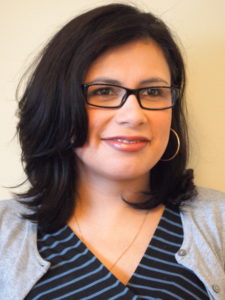Professional social workers prevent crises and counsel on how to cope with the stresses of everyday life. They have a deep understanding of human development and behavior. One of the specialists in this health care field is a child welfare specialist. These social workers protect and serve children. To learn more about this health care career, we recently spoke with Roxana Torrico Meruvia, MSW, PMP.
 ExploreHealthCareers.org (EHC): Tell me a bit about child welfare social work. What makes it so specialized?
ExploreHealthCareers.org (EHC): Tell me a bit about child welfare social work. What makes it so specialized?
Roxana Torrico Meruvia (RTM): The child welfare systems across the country serve some of the most vulnerable children, youths and families. These systems are designed to support families and to protect children from harm through an array of prevention and intervention services (e.g., child protective services, foster care, adoption, etc.). The work conducted within these systems aims to ensure the well-being of at-risk children and youth. Historically, social workers have played critical roles in these systems.
EHC: What inspired you to enter into this field?
RTM: Initially, I didn’t plan to enter the child welfare field, however, I was introduced to child welfare practice during my field placements in graduate school. Because I believe that working to keep families together whenever possible is important, this sparked my interest in the child welfare field. Fortunately, I also received a Title IV-E stipend while in school. The Title IV-E child welfare training program was created to increase the number of practitioners in public child welfare who hold a master’s degree in social work. Upon graduation, I went on to work for a child welfare agency.
EHC: Please briefly describe your current position and where you are located.
RTM: Currently, I am a senior practice associate with the National Association of Social Workers (NASW). I work in the national office in Washington, D.C. NASW is the largest membership organization of professional social workers in the world with more than 120,000 members. We work to enhance the professional growth and development of its members, to create and maintain professional standards and to advance sound social policies across critical practice areas. In my current position, my primary focus is child welfare. I also manage the development and revision of NASW policy statements. These statements set the parameters for NASW’s positions on a broad range of social and professional issues such as child abuse and neglect and foster care and adoption.
EHC: What was your first job in this field? How did school prepare you for this job? How did your life experiences prepare you?
RTM: My first job after graduate school was as a social worker in the foster care system. While school provided me a knowledge base, looking back, I needed more intense on-the-ground training before starting to work with families on my own. It is challenging work and working with vulnerable families is complex. As a twenty-five year old entering the field of child welfare, my life experiences at that time did not help to prepare me for that level of responsibility. I did work part-time at a homelessness program while in school and that helped me tremendously in terms of my awareness of local resources. My first foster care case was a sibling group of six whose mother dropped them off because she was homeless and unable to care for them. I worked with many families that were unable to reunify in a timely manner due to a lack of affordable housing. Seeing these types of cases led me to later working on the intersection of child welfare and housing on a national level.
My experiences in child welfare on the front line taught me so much about the child welfare field and how critical it is to support the child welfare workforce. A dedicated and adequately trained and supported workforce is critical to effectively supporting vulnerable children, youth and families. This continues to influence my work on child welfare workforce issues today.

EHC: What do the day-to-day tasks look like for a child welfare social worker?
RTM: There is no typical day for a child welfare worker. The general tasks involved with being a child welfare worker include making home visits for some of the following reasons: investigating allegations of abuse or neglect, providing assessments to determine whether a parent or guardian is fit to provide care, evaluating whether a child should be temporarily or permanently removed from his living situation and regular ongoing visits to foster care placements. In addition, child welfare social workers must complete extensive documentation, maintain case files and perform other types of administrative tasks. They also attend court hearings regularly. In addition to these day-to-day tasks, workers often deal with crises on the job (e.g., youth running away from group home, foster parent in need of support, etc.).
EHC: What advice do you have for students interested in starting a career in health care? Into a social work career?
RTM: My advice to anyone going into social work is to take advantage of the breadth of the profession. Talk to others in the field, ask about their experiences and learn as much as you can from them. Social workers work in a range of organizations and different roles. As a social worker, you can provide direct service, teach at a university, conduct research, lead an organization and help advocate on critical social issues. The opportunities are endless. I also recommend that anyone considering or entering the social work field read the book Social Work Career Development: A Handbook for Job Hunting and Career Planning. It helped me tremendously over the years. It’s a great resource for all social workers!
For anyone interested in going into child welfare, I recommend going in with your eyes open. It is not for everyone but there are lots of social workers out there that love working directly with families involved with child welfare and are great at their jobs. The child welfare system needs dedicated workers and supervisors.
EHC: What do you wish you knew before you chose to study this field?
RTM: I knew that social work was broad but I didn’t quite understand all the different aspects of the field. I wish that I was not so focused on the clinical aspect and had been more open to the macro side (e.g., administrative, advocacy, policy) of social work, especially since that is where my career path led me.
EHC: Was there a moment when it was confirmed for you that this was the job you were meant to be in?
RTM: I think that there have been moments throughout my career that have impacted me. For example, I was able to see a mother and two-year old daughter reunified after several months of separation due to inadequate housing. I also had the pleasure witnessing a family facing substance abuse and housing issues for many years finally buy their own home. When I first started doing national work, I was able to hear a Congressman read a story about a family that I worked with during a congressional hearing. That was a special moment for me because it linked practice and policy.
EHC: Are there any classes, programs or activities that are not directly related to child welfare that have helped you succeed in this health care career?
RTM: Over the years, I have taken many leadership classes but I have also obtained a Project Management Certificate and Project Management Professional Credential. This certificate and credential have helped to support additional projects that I have worked on. Regardless of what type of social work you are focused on, professional development is important.
EHC: What is the biggest misunderstanding people have about your profession?
RTM: Many assume that all social work jobs are only direct service positions or in some cases, just those in child welfare. Many do not realize that social workers work in a range of positions but their titles may be different.
Interested in learning more about Roxana Meruvia and the work she does for NASW? Connect with her on LinkedIn.
